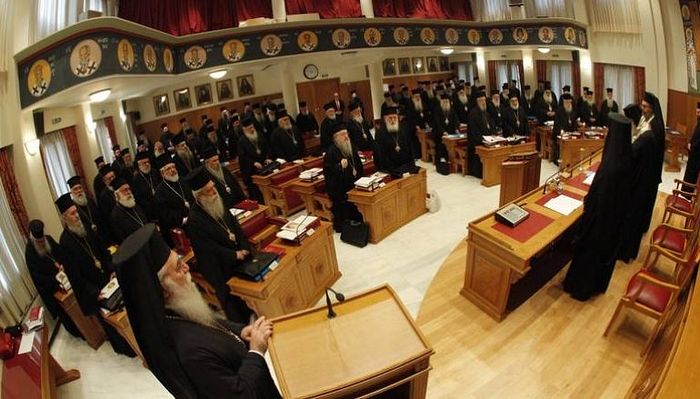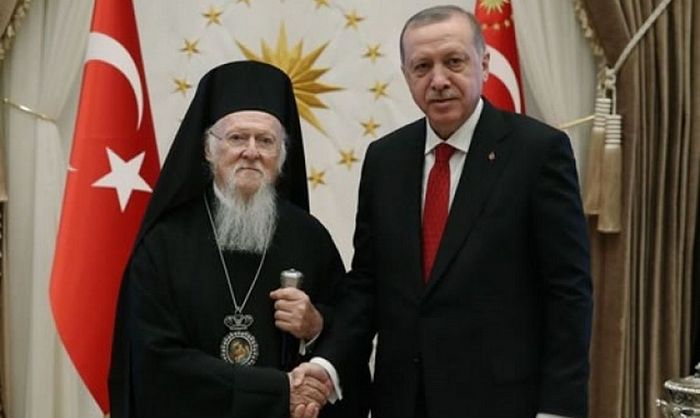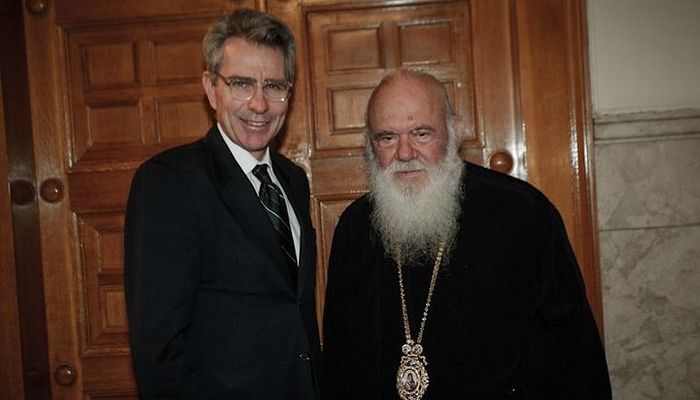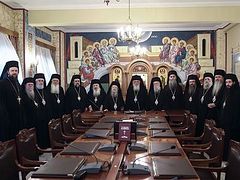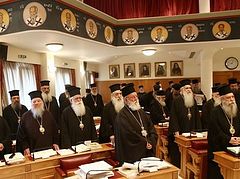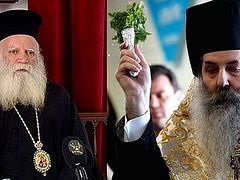On Saturday, October 12, 2019, the Orthodox world was shocked by perhaps the most predictable catastrophe—news that the Greek Orthodox Church has recognized the schismatic OCU.
That was until conflicting reports came out, and now it’s possible there is an internal conflict within the Greek Church over this matter.
As a general disclaimer, when discussing the situation surrounding the Greek Church’s recognition (or lack thereof), of the OCU, we are currently entering the realm of informed speculation. Unless one was present during the council meetings in Athens, we don’t truly know what happened, especially not until more news comes out.
While this author normally dislikes making predictions, this is an incredibly key issue in this already labyrinthian conundrum, and it helps to summarize where we are, what likely happened, and what direction things appear to be going in. We will do this, not with wild speculation, but by looking at the information we do have, and evaluating the current situation and possible future developments.
What happened?
As noted, on October 12, it was announced that after postponing the issue for some time, the Greek Church recognized the schismatic OCU, which previously was recognized only by Constantinople.
There has been profound and wide-scale resistance in the Greek Church to this recognition. Many Greek Hierarchs have already outright condemned the schismatics, such as Metropolitans Seraphim of Piraeus (and here) Nektarios of Corfu, Paxoi, and the Diapontian Islands, Seraphim of Kythira, and Ambrose of Kalavryta. The Metropolis of Piraeus has also called upon the Synod not to recognize the Ukrainian schismatics.
Notably, a powerful open letter to the Holy Synod signed by now reportedly over one thousand Greek people was released, begging the Holy Synod not to recognize the schismatics.
There was hope, that due to this strong resistance, the OCU would not be recognized, or at least recognition would keep being postponed, right up until it was announced that the Greek Church recognized them. The Greek Church was under incredible political and ecclesiastical pressure to recognize them, and so it seemed like they simply caved in.
But then, yet another complicated twist happened.
It was reported that Metropolitans Seraphim of Piraeus and Seraphim of Kythira had issued statements saying the Greek Church has not recognized the OCU.
The Greek hierarchs say the recognition of the OCU was not yet put to a vote, at the full Bishops’ Council; the hierarchs said the Council instead simply reiterated the Synod’s earlier decision, in which they “recognize[d] the Ecumenical Patriarch’s canonical right to issue the status of Autocephaly,” But as OrthoChristian previously noted, the statements coming from Athens are vague enough that it is not clear whether this means they simply support the theoretical right of Constantinople to grant autocephaly, or whether it means they specifically recognize the OCU.
It seems this is not simply a result of poor communication, but very clever communication.
Many of the statements coming from Athens are written in very calculated Byzantine speech, to put it bluntly, the communications are in doublespeak, so the interpretation is intentionally vague and open-ended, allowing whichever interpretation is most expedient at any given moment.
Update: Demonstrative of this issue, the Greek Church just issued a clarification of the council statement, in response to the claims of Metropolitan Seraphim of Kythira that the press committee did not clearly portray what happened:
The Church’s new statement says that the three-member press committee “has expressed the truth of the matter and any other attempt to interpret it does not reflect the reality.”
The statement notes that what was previously declared in the official minutes of the session is based on the recommendations of Archbishop Ieronymos and the results of the discussions that took place, in which 33 of the hierarchs present spoke, and “took its final form and is the decision of the hierarchy.”
Despite all the confusion, the statement still has not clarified if a vote took place which the entire Church of Greece now recognizes. This clarification managed to neither confirm nor deny anything, which makes it barely a clarification. This logic is completely circular, and does not address the core questions, which remain unanswered, notably:
-
Did a vote take place in which all Hierarchs of the Church of Greece participated?
-
What verbatim did the Bishops vote on?
-
What was the result of this vote?
-
Does the Greek Church as a whole simply recognize the theoretical right of Constantinople to grant autocephaly, or do they specifically recognize the OCU?
-
Has OCU head Epiphany Dumenko been added to the diptychs of the Greek Church now?
-
Will the Archbishop of Athens concelebrate with Epiphany?
Seeing as the Holy Synod and Bishops’ Council of the Greek Church voted to entrust Abp. Ieronymos with resolving the matter of recognizing the OCU on behalf of the Greek Church, commemorating Epiphany Dumenko would presumably mean the Greek Church has accepted, and entered into communion with the OCU.
Still, the clarification didn’t explain any of the confusion, or what really happened, it merely said the previous decision was correct while it is still unclear exactly what that decision means and what will happen going forward.
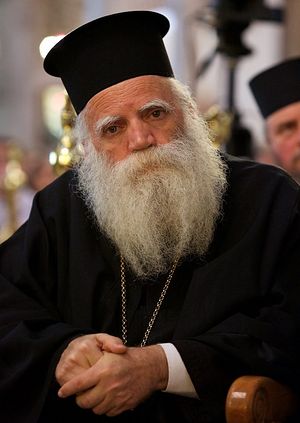 Photo: Met. Seraphim of Kythira For this reason, Met. Seraphim of Kythira said to RIA-Novosti at the beginning of the week, “We did not make a decision. If now, after this discussion, the Archbishop plans to commemorate [Epiphany] or to move ahead, he takes full responsibility upon himself.”
Photo: Met. Seraphim of Kythira For this reason, Met. Seraphim of Kythira said to RIA-Novosti at the beginning of the week, “We did not make a decision. If now, after this discussion, the Archbishop plans to commemorate [Epiphany] or to move ahead, he takes full responsibility upon himself.”
This seems like a key aspect of this confusion; the language is vague enough to allow for multiple interpretations, and it’s possible both sides don’t exactly know what will happen next. In fact, it’s a common diplomatic tactic, wording things in a way to give yourself multiple ways out of a situation.
This may explain why, despite previous reports and apparent confirmations from the Ukrainian schismatics and Constantinople, that the OCU has been officially recognized by the Greek Church, two leading Greek hierarchs are rightfully contesting this.
It seems supporters of recognition are arguing that because Archbishop Ieronymos of Athens supports recognizing the OCU, and because the Council did affirm the “right” of Constantinople to grant “autocephaly”, that this effectively implies the Greek Church de-facto recognizes the OCU.
It appears they just took Occam’s Razor to this contested issue and interpreted the support of two synodical commissions and the Archbishop, as implying the entire Greek Church officially supports the OCU, when a full vote has not yet occurred to confirm or deny this.
If no vote has happened, yet recognition is still going ahead, it would imply that certain people are trying to push this through without the consent of the other hierarchs.
If this is so, it could backfire horribly should other hierarchs stand up and demand a vote, revealing the pro-Constantinople faction is not as infallible and unquestionable as it thinks it is.
It’s a bit like in a certain election, when the political elites and the establishment support a certain favorite candidate, and every poll and expert declares they will certainly win, disregarding the opinion of the regular people, and then they are blindsided when their candidate is beaten by the other they slandered.
Most likely, the signs were always there. It was always clear what the people supported, but the elites, being out of touch as usual, failed to take that into consideration, thinking they will simply tell people whom they should vote for, what they should believe, and it will happen.
Often time elite groups are so convinced of their own propaganda, they forget it’s even propaganda, and they simply totally disregard or miscalculate the actual reality that the people don’t support them. They live in an illusion of their own making.
They can’t imagine that common people may contest their “progressive” ideas.
We have actually seen this trend both in Ukrainian church history, as Archpriest Andrei Tkachev who was born in Lviv (Western Ukraine), notes, and we see this today in the crisis.
We see it when careerists and ultra-liberals within Orthodoxy assume they are the ruling hierarchs, the educated professors, and the “stupid” simple people lacking theology degrees need to just obey them.
In reality, these Neo-Papists and liberals may be surprised that Orthodoxy is a little more democratic than that.
More properly, Orthodoxy is a theocracy directly ruled by Christ, whom the Bishops represent, but no man on earth is his direct and only vicar.
These elites may control and be favored by media sources, they may be able to bury the opinion of traditionalists, especially older hierarchs, who are monastics and not as capable of expressing their opinion in modern mass media, but ultimately, they may be shocked when they find the true pious people on the ground outnumber them—and don’t support them at all.
It is possible this is what we’ve seen: The elite faction that controls the media pushed out their view first, but now slowly we will see hierarchs and clergy contest them.
The two contesting Greek Hierarchs affirm that despite calls to recognize the schismatics, and support for Constantinople’s “right to grand autocephaly”, no actual vote occurred at the council, therefore, the issue is still contested and unresolved.
No vote means that regardless of what was discussed, no resolution can be legally made.
This is important; if this is so, it means the fight for canonical order in Greece isn’t over just yet.
Now the biggest question is, why are there two conflicting reports?
This situation keeps getting more and more complicated, and the waters are getting increasingly muddied.
It was reported by some that the OCU was recognized, and now other Greek Bishops are saying it was not recognized. What actually happened?
We are witnessing the fruition of Metropolitan Seraphim of Kythira’s previous warning, that indeed, Constantinople’s actions have divided the Greek Church.
We are witnessing, right now, apparent internal division in the Greek Church over Ukraine.
It is possible, (and probable) that the cause for the conflicting claims is not simply communication errors, but this division in action:
The pro-Constantinople faction affirmed they support Constantinople, who supports the OCU, and therefore they also support the OCU—regardless if an actual vote took place confirming what they want to believe.
They took advantage of the vague decision of the council, and the fact that most people don’t speak Greek, and certainly weren’t privy to its meetings, and therefore, they interpreted the Council’s decision (or lack thereof) in a way which supports their position, and ran to the press with it before the traditionalist faction, hoping to simply pass off their opinion and desires as fact.
As the Constantinople faction is probably the most technology, media, and PR savvy, they probably hoped if they just beat everyone to the press and flooded the news with their position, it would just be accepted.
The pro-Constantinople faction also appears to be made up of younger hierarchs and clergy, more carrier oriented. It’s important to emphasize that their support for Constantinople appears to be more based in Greek nationalism and the idea that the Greeks always support Constantinople, rather than any love for the OCU itself.
Pat. Bartholomew stated outright in October of last year that, “Our Slavic brothers cannot tolerate the primacy of the Ecumenical Patriarchate and our nation in Orthodoxy,” and “Whether our Russian brothers like it or not, sooner or later, they will follow the decisions of the Ecumenical Patriarch, because they have no other choice.” Another Greek hierarch basically said that they must support Constantinople mainly because they’re Greek. It seems the Patriarchate which once condemned ecclesiastical nationalism, is now swallowed by it.
None the less, thousands of Greek clergymen are opposing the OCU, and therefore it seems the Phanar supporters are using very calculated and cunning wording and actions in all their decisions, trying to push this through without starting a war within their own church.
This could all be a case of Byzantine Machiavellianism at work; Constantinople copied the renaissance era Italian ecclesiology, why not their politics as well? They speak with the eloquence, some would say cunning, of Odysseus (or perhaps their “western brothers” in Rome prefer Ulysses). They push the narrative which suits them.
The New Lands and the Captivity of the Greek Church
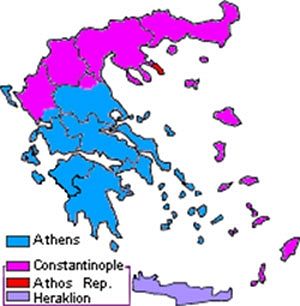 Church of Greece For a true philhellene, the world of Hellas is in a sad state. By some turn of fate, the Greek Church has become captive to occupied Constantinople, which certainly is not free or independent in its actions, but according to its own archivists, served as a “tool” with for the U.S. Government since Truman, not to mention their location in an Islamist country.
Church of Greece For a true philhellene, the world of Hellas is in a sad state. By some turn of fate, the Greek Church has become captive to occupied Constantinople, which certainly is not free or independent in its actions, but according to its own archivists, served as a “tool” with for the U.S. Government since Truman, not to mention their location in an Islamist country.
Such a Stockholm Syndrome in Orthodoxy, I haven’t seen since a series of Cossack/Ukrainian dumy (tragic bard songs).
There is one such duma (song), Із полону з-під Ізмаїлу (From captivity in Izmail) which is one of the most depressingly tragic, yet hauntingly beautiful songs in the Ukrainian language. Even if you can’t understand it, I encourage you to at least listen to it; it sets the mood, so to speak, and gives you an idea how Ukrainians feel this day about the religious and political crisis, when you no longer recognize some of your own people, and they don’t recognize you.
The song tells the tale of many slaves freed by Zaporozhian Cossacks from Turkish slavery in Izmail, which was their fortress in the south of Ukraine in modern Odessa province. The Cossacks liberate the captives and try to lead them back into the Ukraine where the Dnipro river flows freely from Kiev Caves Lavra. The captives however looked back and fled from their own people, willingly going back to Turkish captivity because most of them were born or raised there, or otherwise had families, wives, or children born there. They asked the Cossacks to release them back to Izmail, saying they did not wish to live in Ukraine, as they already forgotten Orthodox lands. The tale ends tragically.
This also reflects the story of Maria (Marusia) Bohuslavka, a legendary Ukrainian heroine from the Kiev Region of Little Russia in around the seventeenth century, the same time the song takes place.
Marusia was the beautiful daughter of the priest of the city of Bohuslav near Kiev, until she was kidnapped by the Turks for a harem—as Ukrainian women are famed for their beauty—and one of them, Roxelana, even became the wife of Sultan Suleiman the Magnificent in history. Marusia is often compared to Roxelana.1
In the tale, she rose up from the harem, just like Roxelana, and eventually gained the trust of her Turkish husband (if he can be called that), the Sultan of Istanbul, and stole the palace keys, where she went into the dungeons to visit captive Cossacks.
The truly tragic part is not even her dialog with them, but what came next. She freed them who had been captive for 40 years, but she would not go with them. She merely asked them to send her love and a piece of her heart back to her native lands of Kiev, as she was abducted at such a young age, and her life in the harem was the only one she knew.
She rescued the Cossacks, and they returned to their homeland, but Marusia would never see the green hills of Kiev again, having even forgotten the indescribably deep blue color of the mighty Dnipro River and the sound of nightingales on Lavra Hill singing over gold domed churches. Her Turkish husband murdered her. This tale also comes in bard song and spoken word form, as well as an old animated story from 1966.
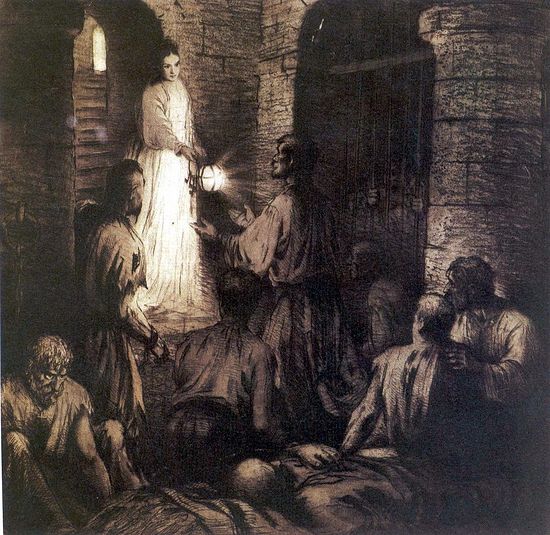 M.Deregus. Marusia Bohuslavka.
M.Deregus. Marusia Bohuslavka.
This is not simply a tragic tale, but an important anecdote. These bards’ songs, while legendary, record historical aspects of their time periods. There was a real phenomenon, that some people who had been in Islamic Turkish slavery for so long, chose to remain behind and forgot their Orthodox ways.
In both cases, the captured peoples said they have “already forgotten what it’s like to live in Orthodox lands” and preferred to remain slaves to the Ottoman Moslems. This may sound crazy, but these legends are ingrained in the profound tradition of Ukrainian folklore and kobzar bard-songs.
It is also imperative to note that a great deal of the Greek Church’s support for Constantinople comes from the fact that the Church of Greece is not entirely free. Many of the Greek hierarchs who support Constantinople come from the so-called New Lands, which is a region of northern Greece, where they are under a strange double subordination to Athens, but ultimately to Constantinople as well. Constantinople also has direct control over the Dodecanese islands, Crete, and other territories, not to mention Athos. This situation was summarized in this article.
The sheer irony is that Constantinople’s argument for their control over parts of the modern independent state of Greece—for the control of Pat. Bartholomew, a citizen and former soldier of the Turkish army—is because they are the same nation and historically part of the same country…
This is the exact same argument they oppose in Ukraine, which began as a single Rus’ nation, and rejoined Russia in the mid-17th century, and remained a part since 1991.
Greeks haven’t ruled Greece from Constantinople since 1453, but anyone over the age of 40 remembers when Russia and Ukraine were the same country.
Of course, no one is arguing that this means Russia should “control” Ukraine; the Ukrainian Orthodox Church actually enjoys more freedom from Moscow than the Greek Orthodox Church from Constantinople.
It’s simply ironic that Constantinople argues that Ukraine needs an autocephalic church because it’s been an independent state for less than 30 years, but Greece, also an independent state since the mid-1800s doesn’t get an independent church due to “historical ties” with ancient Constantinople.
Pat. Bartholomew, a Turkish citizen who loves his Moslem brothers, uses those historical ties to justify control over half of Greece.
It has often been expressed that many hierarchs are simply afraid. If they don’t support Constantinople, Pat. Bartholomew will take the new territories from them.
Furthermore, despite this, Met. Seraphim of Kythira writes that there are even hierarchs from the New Lands who also oppose recognizing the OCU, but who did not speak up because they do not want their view to become public…
This is more evidence that the matter has not yet been decided, and there is still opposition in the Greek Church.
There is also the influence from the other New Land far across the Atlantic from the pillars of Hercules.
It’s truly amazing how some people complain about the relationship between the Russian Orthodox Church with the Russian government—who share a common homeland—yet these same people are silent to the obvious influence of the American government in the Ecumenical Patriarchate, in Ukraine, and in Greece.
Let’s not forget the infamous words of Patriarch Athenagoras of Constantinople in an interview with the Evening Independent, as quoted by the Union of Orthodox Journalists:
“I will always promote America and American interests, live by American ideals and preach them. I will never forget this great country.”23
We have an entire article about the ties between Patriarch Athenagoras (who tried to enlist in the U.S. Army) and the U.S. Government.
The Greek Church and Archbishop Ieronymos are under a great deal of direct political pressure from the Americans and others to recognize the OCU. As a result, it’s possible they are (figuratively speaking) being held hostage in this situation.
Just take this extremely bizarre claim of the Archbishop into consideration:
“We all know that the proclamation of the autocephaly of the Church of Ukraine is extremely useful for the entire Orthodox Church and will be invaluable for strengthening relations between the two autocephalous Orthodox Churches—the sisters, great Russia and Ukraine.”
How will causing a canonical war in the middle of the Russian Church strengthen relations between the church and the schismatics? It’s like claiming that the invasion of a country will help bring peace between the people and the invaders.
The real question is, how can he possibly believe those words? Is this really his honest opinion? How free is he to act and speak as he chooses?
It almost seems like he is saying this with a gun to the head, so to speak.
The Archbishop is an extremely intelligent man, and for that matter, so is Patriarch Bartholomew. It is impossible for anyone in such a position to be that naïve; nobody naturally talks like that.
That position is so far out of reality, that there are only a few reasonable explanations, which mostly boil down to:
-
The Greek Church is literally being forced by Constantinople and various state powers to support the schismatics.
-
Supporters of Constantinople and the OCU are so devoted to this schism, and their own false ecclesiology, that they’ve lost all sense of honesty or reality.
-
This is Byzantine-style ecclesiastical doublespeak.
-
A combination of the above.
At this point, I have no idea which conclusion is worse.
What’s at stake—the big picture
Perhaps instead of the Ukrainian Church Crisis, we should call this the Great Canonical Crisis, because, let’s face it, this issue is much bigger than Ukraine; Ukraine is just the battlefield now, where a larger war is taking place. The Ukrainian Church Crisis is in fact more of a political crisis—if governments and radical groups would stop persecuting the Ukrainian Orthodox Church, the schismatics would have no ammunition.
The canonical Church enjoys the support of the majority of the actual practicing Orthodox of Ukraine. This is plainly evidenced by the Ukrainian government itself admitting the cross procession of the canonical church (which is heavily persecuted and supposedly “unpopular”) was twice as large as that of the schismatics—who of course receive political support. The Ukrainian Church Crisis is largely fueled by the political crisis. It’s not truly a religious issue at its core, as the schismatics themselves are more interested in nationalism than religion.
The same cannot be said for this much larger, great canonical crisis in the Orthodox world—which is the Eastern Papism coming from Constantinople and their new “first-without-equals” ideology. It may be all sparked by complex history and political connections to the U.S. Government; so in other words, this too may be originally a political crisis in its origin. But this disease infecting Constantinople has metastasized from the political sphere to the ecclesiological, thence to the theological, and it has become a religious crisis.
Far beyond the internal ecclesiastical life of Ukraine, when local churches are dealing with this issue, they must seriously consider the following questions, which permanently affect universal Orthodoxy:
-
Will Orthodox Churches truly recognize Constantinople as it describe itself:
-
Does Constantinople have the right to intervene or hear appeals on the territory of any church? According to St. Nicodemus of the Holy Mountain, who literally wrote the book on canon law, no…they do not have this right.789
-
If Constantinople can do all this, Local Churches beware—it can happen to you too. This means if any Local Church opposes Constantinople or their supporters, they could theoretically bring them (or rather, schismatics on their territory) “freedom and autocephaly” with a tomos that carries all the weight of a medieval iron ball-and-chain as a kind gift from the Greek brothers. Timeo Danaos et dona ferentes10.
-
Will everyone turn a blind eye to the obvious dealings of Constantinople with the U.S. Government? We are not talking about a local church cooperating with its local government on joint protects within its own nation, but a patriarchate based in an increasingly Islamized Turkey collaborating with the U.S.
-
What about Constantinople’s constant ecumenist ties to the Vatican? Meeting the pope is one matter; but Constantinople representatives consistently seemed to be tied up in liberal and pro-homosexual trends in Orthodoxy, such as those promoted by the Jesuit Fordham University, or openly homosexual Michael Huffington’s own ecumenist foundation at Loyola University11.
-
Constantinople supports a church in Ukraine filled with Nazi sympathizers12 who regularly assault Ukrainian Christians. Is this not alone a crisis, especially combined with the aforementioned issues and the division in Orthodoxy this caused?
As a result, we could be witnessing a complete fracture of the Orthodox world, a schism between Greeks and Russians or directly down liberal and conservative lines.
In that worst-case scenario all throughout Orthodoxy we could see divides and splits. Let’s sincerely pray it doesn’t come to that.
What if the Greek Church didn’t recognize the OCU?
If the Greek Church did not in fact have a legally binding vote at the bishop’s council, or any vote at all as the two Greek Metropolitans claimed, then there will at least need to be a gathering or statement from all the other bishops who contest this recognition to make it clear that this is a large body, with a consistent story—there was no vote, so no recognition. There are thousands of Greek clergy, including hierarchs, who oppose this recognition after all.
Various scenarios could unfold in the event there was no actual vote.
The Constantinople faction could simply interpret the statement of support for Constantinople’s power to grant autocephaly is sufficient, and claim that those opposing it are the source of the problems; and the elites in power will go ahead and act as if the OCU is already recognized.
We have already seen Greek Hierarchs (unsurprisingly from the New Lands) serve with OCU schismatics before this council meeting, and there is no reason to assume they will stop at this point.
Those who serve with the schismatics will continue to serve with them; those who want to serve with them will feel emboldened to interpret this council resolution as reason enough to serve with them, regardless of whether there was a vote or not.
Traditionalist hierarchs will call for a council, and those supporting the OCU will likely claim there is no need for one, as the decision was already made.
This would echo Constantinople’s refusal to have a pan-Orthodox council on this issue, despite the majority of other primates constantly calling for one.
They will simply ignore these calls and do as they please.
Effectively, we may see order in the Church of Greece break down. Each bishop will decide for himself what he will do, and who will he will recognize.
Unless a vast number of traditionalist hierarchs go on record against this, and demand a council and vote, it’s unlikely anything will stop those who recognize the OCU already from continuing to recognize them—they will just hide behind Constantinople; and until the greater problem is tackled by universal Orthodoxy, nothing will likely change the minds of those bishops.
Ultimately, we have to simply wait and see what will develop in the Church of Greece. Hopefully there will be mass resistance against these illegal canonical actions, but realistically, it seems that at the very least there will still be a splinter group in the New Lands and other Constantinople territories who will stand by them until the end, and until the issue with Constantinople is resolved, they won’t change.
If the Church of Greece didn’t support the OCU, the most likely scenario may be that each faction will simply continue what they’ve been doing until this issue is finally resolved at a pan-Orthodox council.
This is a serious issue. No one should take this as a passing crisis. We may look at an event which goes down in history as either a second great schism, or an eighth ecumenical council.
There will be many opportunities for holiness in supporting the unity and canonicity of Christ’s church, just as many holy luminaries of Constantinople did, such as St. John Chrysostom.
There is also the great risk of joining the darker side of history, and having your name go down beside Nestorius the heretic, who, by the way, was also Patriarch of Constantinople.
If the Greek Church did recognize the OCU, then why? And what’s next?
If the worst-case scenario comes to pass, and the Greek Church did, or ultimately does recognize the OCU, why did this happen, and what is next? The brilliant Russian Journalist Kirill Alexandrov provides excellent analysis. Here is a translation from his Russian article.
Why did this happen?
The answer to this question can be found by logical deduction.
Did the Greeks recognize the OCU because they are truly certain it is a real grace-filled local church? That she received her origin on a canonical basis through the actual unification of all Orthodoxy in Ukraine?
No, it can’t be so. Otherwise, why did the Greeks postpone recognition for almost a year? And everyone knows that the creation of the OCU did not cure the church schism in Ukraine, but deepened it even more. Moreover, the creation of the OCU gave rise to a new split, this time between Epiphany and Philaret Denisenko.
Is it possible the OCU is following God’s commandments?
No. It commits raider-style seizures of churches, atrocities and other attacks. Violence and threats from supporters of the OCU are well known facts.
Is the OCU a persecuted church that needs support and recognition?
No. Few religious organizations in modern history have enjoyed such powerful state support as from the Ukrainian government to the OCU. Everyone from the president to governors and mayors have helped this organization, along with the successor agency to the KGB in Ukraine, the courts, and the police.
Then why did the Greeks recognize the OCU?...
The support for the OCU is primarily the result of political ties with Western powers, and Constantinople, of course, having also that same alignment.
Kirill Alexandrov goes on to note the incredibly close ties between U.S. State Department officials with matters concerning the ecumenical patriarchate and the OCU. One of the highest ranking Ukrainian OCU schismatics, Makary Maletich, former Primate of the UAOC declared that Bartholomew only made this decision because he had the support from the US Government. This is directly from the mouth of an OCU leader.
US officials in Greece frequently get involved in church matters and stress the importance of “support for the ecumenical patriarchate”.13
It doesn’t take a political scientist to realize that that “support” is implied as a demand, and when the former US Ambassador to Ukraine who served there during the Maidan coup is now ambassador to Greece, it becomes blatantly obvious that the same people are up to the same tricks.
Alexandrov goes on to note that despite the fact that Greece is officially an Orthodox country, with an almost completely at least nominal Orthodox population, there are still laws passed supporting homosexuals because Greece is under crippling financial and political pressure, and they are dependent on the EU, who are ultimately aligned with the US.
He notes that in Greece, the Church is funded by and built into the state apparatus, and all Greek Bishops and clergy receive their salaries from the state budget. This, by the way, is unlike Russia or Ukraine, where clergy are paid directly by their church, and are in fact less dependent on the state than in Greece, where the state is literally the one signing their paychecks.
The main warning of the article is that if the Church of Greece goes along with this, we will already be seeing a schism happen in Orthodoxy, which could divide the entire Greek church, as well as Mount Athos.
Alexandrov also notes how ridiculous it is to recognize a church where most of the clergy were not even canonically ordained.
Philaret for example, was the former Metropolitan of Kiev. However, he ordained Epiphany a priest and later bishop while he was already in schism, and this was recognized by the Ecumenical Patriarchate. As a result, it is one thing to receive Philaret back (which is also questionable), but the Ecumenical Patriarchate received Epiphany in his existing status without a canonical ordination, without repentance, and without even re-ordination.
This prompted Philaret, who is now in schism from his schismatic former protégé Epiphany, to finally declare the truth, that practically the entire episcopate was ordained in schism:
“Okay, if the Ecumenical Patriarch removed the anathema from me in 2018, then until 2018 was I under anathema or not? If I was under anathema, that means that all these bishops are illegitimate, and Epiphany is not only not a metropolitan—he’s not even a priest. If the Ecumenical Patriarch removed the anathema from me in 2018, then the entire episcopate is invalid!” Philaret declared.
While Philaret said that as an assault against Epiphany, it’s actually true—he was under anathema, Constantinople recognized it as of around a year ago, and therefore to recognize those he consecrated under anathema means that the entire process of valid ordinations and anathematization goes out the window. It is no longer clear at all who is Orthodox and who is a schismatic, because everything is leavened by the love of Pat. Bartholomew of Constantinople, which decides and unites all.
Epiphany also declared that he is proud of Nazi WW2 era leader Stepan Bandera, who was allied with Hitler. These are the type of people Pat. Bartholomew is in communion with.
The situation is even worse when we consider “Metropolitan” Makary Maletich who received his “ordination” from the child molester Viktor Chekalin, a defrocked deacon who pretended to be a bishop.
This means there are hierarchs in communion with the Ecumenical Patriarchate who never received a canonical ordination.
Some will argue that because we receive priests of other denominations by vesting, which is to say, in their existing dignity, there is no issue, but this is flawed for several reasons:
-
Roman Catholic priests, for example, received by vesting come as individuals. It’s an entirely different matter—individual priests vs. a schismatic jurisdiction. The practice of receiving by vesting after repentance is almost always practiced on individuals.
-
Priests of other faiths were never schismatics in rebellion from Orthodoxy, as they were never Orthodox to begin with. Before being received into Orthodoxy, these priests first must reject false doctrine they practiced, which is a confessional form of repentance. Constantinople received these schismatics as if they did nothing wrong.
-
Ultimately, receiving by vesting is an act of economia, which is one matter for an individual. The real question is this: Does anyone want to be in communion with a jurisdiction that is barely Orthodox, and only by technicality and economia?
Another important issue is the entangling web of schisms.
When you enter into communion with someone, you are also practically speaking, entering into communion with anyone whom they are in communion with.
OCU schismatics continue to serve with and maintain close ties with Uniates, in addition to other schismatics, including those whom Constantinople itself excommunicated.
The OCU is on a collision course to communion with the Uniates, and if the Greek Church recognizes them, they will effectively be accepting the Unia.
The head of the Uniate church, Svatoslav Shevchuk declared that the ultimate goal of the Uniates and schismatics is to create a single patriarchate, in union with both Rome and Constantinople. “This is not utopian thinking, as some people call it. This is the goal of the ecumenical movement,” said Shevchuk.
Let’s recall what the Uniates have done in Ukraine.
Uniates were historically among the greatest persecutors of Orthodoxy, especially in Ukraine, and are also heavily involved in persecuting and attacking believers of the Ukrainian Orthodox Church today.
They also work together very well with the OCU. For example, against the backdrop of a blasphemous icon of the Mother of God together with soldiers in Nazi uniforms. Members of the OCU served a funeral for members of the Nazi SS together with Uniates. The schismatic and heretical clergy commented that they consider the SS fighters to already be saints.
Uniate clergy have frequently served memorial services for Nazis, complete with honor guards in Nazi uniforms. There was also an incident when a high-ranking mitered Uniate priest, glorifying WW2-era Nazi collaborators, called for terror and assassination.
There was also the terrifying moment when the infamous Uniate Chaplain Nikolai Medinsky assaulted Orthodox grandmothers while seizing a church in Kolomyya, while he and his fellow Greek Catholic priests declared: “We will not throw crumbs to you Moscow pigs. You are biomass devoid of rights. We will take not only this church from you, we will take it all. We will kick you off our land, and from the Kiev Caves Lavra!”
The Union of Orthodox Journalists made an English-language YouTube video discussing the assaults of the Uniates on the Orthodox.
Ukrainian Archpriest Fr. Rostislav Yarema, a Doctor of Theology from Lviv, Western Ukraine, writes that in 1990, there were 2,639 parishes of the Russian Orthodox Church in Galicia (Western Ukraine), and that between 1990 and 1997, the Uniates seized around 2,000 of them, including around 1,000 in the Lviv Province alone.
This is not even withstanding the regular attacks committed by the OCU against the canonical church. The OCU and the Uniates are filled with real-life Nazis.
Take for example schismatic “priest” Alexander Dedyukhin, who was known for posting speeches by Adolf Hitler on his Facebook page; ironically, the Ukrainian nationalist “priest” seems to post in the Russian language. Dedyukhin is known for several extremist and anti-Christian views, especially:
-
Saying the Maidan coup that overthrew the former Ukrainian government was an act of the Holy Spirit, comparing the Molotov cocktails used to the fire of the Holy Spirit.
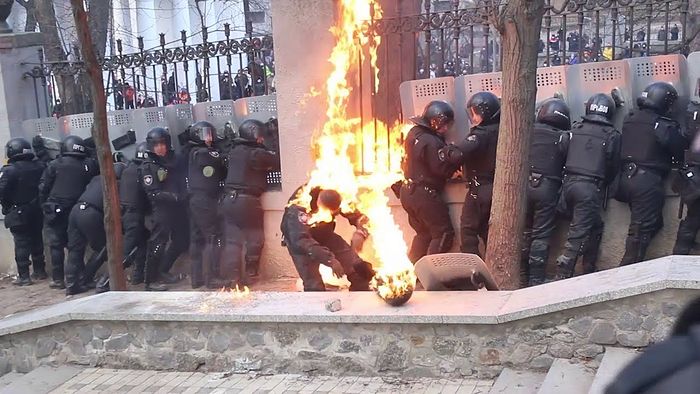 Many law enforcement workers at the Maidan revolution died in Molotov cocktail attacks. Photo: chhag.livejournal.com
Many law enforcement workers at the Maidan revolution died in Molotov cocktail attacks. Photo: chhag.livejournal.com
-
Saying a terrorist attack in Russia that killed at least 15 people was the answer to the Kiev Patriarchate’s prayers.
-
Claiming that Drugs and prostitution should be legalized.
-
And who could forget “Father” Dedyukhin’s teaching on forgiveness, which besides being an understatement is unorthodox in every sense of the word. According to this schismatic cleric, the best way to forgive an enemy is to simply kill him. Here is what he said specifically:
-
“Forgiveness comes in different forms. There is forgiveness through the scope of an automatic—that is how to forgive an aggressor, sending him 6 to 12 grams of love to one of his vital organs. This also frees us. The main thing is not to forget the simple truth: a dead enemy is no longer an enemy. A dead enemy is just a corpse. And we gain freedom by forgiving as much as we can;”
-
These are the type of people who represent the schismatics, and this specific priest was shamefully awarded by Patriarch Bartholomew!
How is it possible that any Orthodox support these people? The argument that Pat. Bartholomew simply doesn’t know about this, is not worth considering. If this information is reaching regular Orthodox Christians in the English language, a Patriarch should certainly be aware of what is even an open secret in Ukraine—that many OCU members are Nazi supporters.
The famous Greek theologian Protopresbyter Theodore Zisis, who is one of the many Greek spiritual authorities opposing the schism, summarizes this perfectly. He calls the actions of Patriarch Bartholomew:
“A new crusade against the Russian Church on behalf of the Uniate-crusaders and schismatics of Ukraine, in which Patriarch Bartholomew takes the most active part in alliance with the pope who only pretends that he remains neutral.”
It is also extremely symbolic, as Alexandrov notes, that news of this recognition happened just before the Feast of the Protection of the Mother of God, which is greatly venerated in Rus’, especially among Don Cossacks, but essentially ignored in Greece, though it should be the other way around.
The feast celebrates the miracle of when the Most Holy Theotokos with her Veil protected Constantinople from the raid of not yet baptized Russians in the ninth century. Then, after prayer in the Blachernae church the Theotokos appeared. A rising storm destroyed the Russian fleet, and Constantinople was saved.
Russians love this holiday; it is marked in the Russian typicon as a major feast. They literally celebrate their own defeat! The fact that they are on the side of the Orthodox Greeks, and not their own ancestors who were pagans shows how Russians place their Orthodox faith above their national pride.
Meanwhile, Bartholomew practically declares Greek racial supremacy; and the modern Greeks make statements declaring how they should never conflict with the Ecumenical Patriarchate on Ukraine, and that because they are the same race as Constantinople, they must support them.
If the Greek Church supports the OCU, if anyone does this, they are turning a blind eye to the scourging of the Body of Christ, as Bartholomew did. As a result, the suffering and blood of the Ukrainian people is on whomever recognizes these heretics and their collaborators.
Truly the blood of the martyrs is the seed of the church, and only makes her grow, but woe to him who has their blood on his hands…

